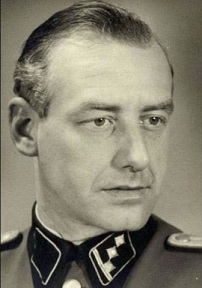Biography Albert Gemmeker
He was in charge of the rather smooth deportation of 80.000 jews from the Netherlands during World War II; after the war he was sentenced to ten years in jail; he was already released after six years and from 1951 he lived as a free man in his hometown Düsseldorf in Germany: Albert Konrad Gemmeker, the commander of the transition camp for jews near the Dutch village of Westerbork, deserved this rather mild punishment thanks to the fact that he denied any knowledge of the fate of the jews in the camps in Poland they were sent to. And also thanks to the impression he made as a camp commander: he didn’t beat up prisoners, he didn’t curse, he acted as a correct person.
During the research for Gemmekers biography Ad van Liempt found out that this impression is quite disputable. Gemmeker put people into the deportation train who didn’t lift their cap when they crossed his path; or he deported them as a reprisal for attempts of inmates to flee the camp. He could be cold and relentless, obeyed his superiors in the most extreme way, and didn’t hesitate to sent ill and crippled people on a three day trip to the camps in wagons meant for cattle.
After his release Gemmeker lived 31 more years, but the research brought up that he didn’t enjoy this period quite undisturbedly. From the year 1959 German justice autorities tried seriously to correct the Dutch verdict. The Special Court of Assen had convicted him in 1949 for unlawful detention of the arrested jews, not for the complicity of the committed genocide. The German public persecutor did try the last, even twice. The investigations procedures lasted alltogether about seventeen years. In the end, in 1976, Gemmeker was discharged definitively, because the prosecuter supposed that Gemmekers knowledge of the fate of his victims couldn’t be proved.
During this period of time mr Gemmeker kept denying any knowledge - even during the twelve interrogations by the investigating judge dr Wolfgang Steffen. Researcher Ad van Liempt was permitted to interview this magistrate, who, from 1971 tot 1974, was retained to do the interrogations of many witnisses and the accused as well. Dr Steffen declared that he is convinced that mr Gemmeker was aware of the fact that the jews wouldn’t survive the concentration camps. It was dr Steffens opinion that the Gemmeker-case should have been brought up for the court, but he wasn’t able to influence the decision of the independant prosecutor in Düsseldorf.
During his research the autor also interviewed two daughters and a granddaughter of of the former camp commander mr Gemmeker. The daughters didn’t live with him for a long time, because Gemmeker and their mother divorced when they were young girls. They have great doubts about his credibility. The research brought about that mr Gemmeker produced a lot of untrue statements during his interrogations. He persisted in saying that, working for the Gestapo in Düsseldorf during the nineteenthirties, he had nothing to do with hostilities against the German jews. When he, after his release from the Dutch prison, tried to be denazificated, he didn’t mention his past as a camp commander. When a document showed up that mentioned his presence at a meeting with Adolf Eichmann, the notorious manager of the extermination of the European jews, he simply denied that he was in the room.
Seventeen years of research about the question if Gemmeker knew the fate of the jews, produced a huge pile of documents in German archives. Up till now this material was considered to be confident, but for this project autor Ad van Liempt was given full access.
The defense of Ad van Liempt's thesis will take place on 9 May, 14.30 hrs in the aula of the Academy Building.
Promotores prof. J.W. Renders and prof D.F.J. Bosscher
Email: avliempt@icloud.com
Interview with Ad van Liempt on the UG-website
Review Biografieportaal.nl

